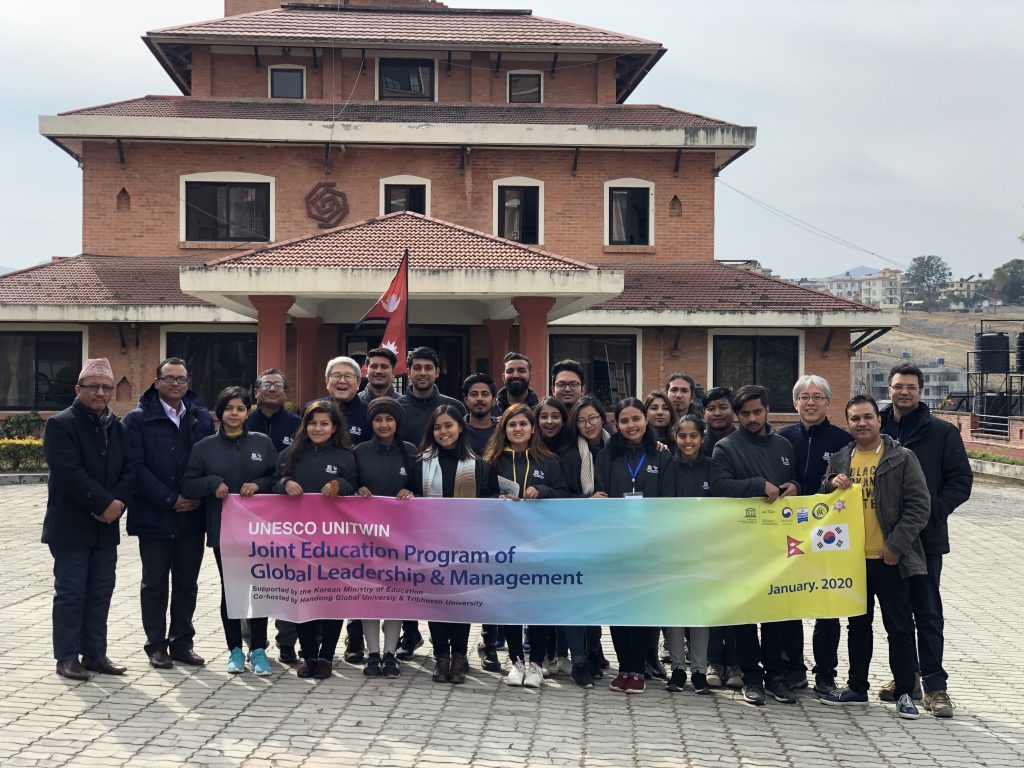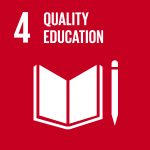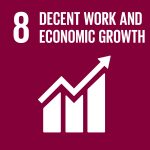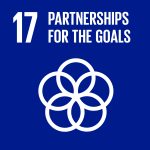Inspiring "Glocal" Change through "Creatinnovative" Ideas: Achieving SDGs Based on Partnerships and a Holistic Approach
Description
Institution
Handong Global University

Organizations/areas of the university involved
Handong Global University, Republic of Korea and Tribhuvan University, Nepal
Country
The Republic of Korea
Handong Global University, Republic of Korea and Tribhuvan University, Nepal foster leaders who are committed to solving social problems with “glocal” (global-local) perspective and “creatinnovative” (creative-innovative) ideas.
The MBA course in Global Leadership and Management (GLM) was established in 2014 in partnership with Handong Global University (HGU), Republic of Korea and Tribhuvan University (TU), Nepal. Housed within the School of Management in TU, it is a 2-year course that consists of 12 credits in intensive camps. 20 students are admitted every year, and the students come from all over Nepal. Grounded in a holistic approach, this program is designed to foster leaders who are committed to solving social problems with “Glocal” (global-local) perspective and “creatinnovative” (creative-innovative) ideas.
One of the aims of the program is to inspire students to know their responsibility in society and want to create positive change on sustainable development. It offers an inter-disciplinary approach to the social challenges in Nepal and provides real-world, project-based learning. Graduates gain an understanding of sustainable development and are equipped to play a key role in establishing social enterprises and driving social innovation.
During the intensive camps, students learn about the concept of social entrepreneurship and innovation. They work on business models, plans and social marketing campaigns seeking solutions for pressing social issues in Nepal, and the initiatives are developed through constant feedback from professors in HGU and TU from various fields. These fields include business management, economics, law, and social welfare, as well as engineering. Guest experts are also invited to provide feedback from the public, industry, and NGO sectors.
Students also have the opportunity to engage in field research at the local level and pitching their projects to prospective investors during the visit to Korea. Moreover, professors provide continuous consulting opportunities for the graduates who start social enterprises or work in related fields. Those graduates often become mentors of the students, sharing their experiences and giving practical advice.
The program seeks to strengthen teaching on social problem analysis in the local community context that the solutions students present are rooted in local resources. Furthermore, HGU and TU plan to establish a social innovation platform through the GLM alumni forum. Building on the experiences of graduates, it will explore sustainable ways of bringing social innovation to Nepal and contribute to raising public awareness.
Results and impact measured or expected
For 8 years, the GLM course graduated 100 students and educates 39 students as of 2021. Over 30 business models that students have created cover a broad agenda of issues: ecology, gender, poverty, unemployment, etc. As the program focuses on a local community-based approach for sustainable development, a number of local projects have been put into practice. Some graduates engage in agriculture and agribusiness in rural areas and run an eco-friendly homestay, making use of local resources and appropriate technology.
Among the initiatives, two social enterprises created by graduates are remarkable: One is “Let’s food,” which hires victims of human trafficking in Nepal and empowers them to become economically independent by providing knowledge and skills for food business. The other is “Saral Smadhan,” which offers electrical and plumbing services for effective damage recovery after the Nepal earthquake. There are 3-4 more upcoming initiatives of starting start-ups, including producing biodegradable packaging.
Connection with the SDG framework
The GLM course reaches across many of the SDGs, and it makes a significant contribution to SDG Goal 4, 8 and 17. Based on a holistic approach, it helps students to gain an understanding of key sustainable development issues in the“ glocal ”context . The program highlights the importance of identifying sustainable development challenges and involves the combination of several academic disciplines to address them. Students are empowered to start their own business with the concept of SDGs and engage in social innovation practices, which lead to creating decent work.
The GLM course was established in a partnership with HGU and TU, which is an example of north-south cooperation and SDG 17. It further provides learning opportunities to students, faculty and even graduates who wish to share innovative solutions to social issues. HGU and TU have been building a network across graduates, global faculty and experts from various sectors and communities.
Barriers and follow up
At the outset, the concepts of social entrepreneurship were new in Nepal, and the process was challenging to convince TU faculty and students that they are worthwhile. Also, there was a lack of mutual understanding of the social and cultural differences between Korea and Nepal HGU professors persuaded that social innovation and sustainable development are the key to prosperity in Nepal and focused on building long-term, trust-based relationships. In the process, some TU professors played a crucial role in persuading their colleagues and bridging the gap.
Another major challenge was the resistance of TU professors to an interdisciplinary approach. They were not used to the collaborative approach to education and reluctant to working with faculty from other academic disciplines. HGU has been sharing know-how, drawing on its many years of experience in interdisciplinary collaborations. The program now expands academic collaborative partnerships by inviting external experts from various fields and sectors.
Transferability of the initiative
HGU’s efforts to support the capacity building of TU faculty have empowered them to take the initiative in running the GLM course. Some TU professors become the agents of the change and play a leading role in introducing social entrepreneurship and SDGs to other universities in Nepal through the workshops Several TU local campuses and more than 5 universities including Kathmandu University, Pokhara University, and Mid-Western University have joined the workshops and expressed interest in benchmarking the success of the GLM course.
The professors were also invited to the workshop organized by Battambang University in Cambodia to share their experiences. Moreover, two international business plan competitions were held in Thailand and Korea with the participation of students and faculty from Nepal, Korea, Thailand, Mongolia, Indonesia, etc. Some TU faculty have been involved in local community projects and now prepare for launching the Youth Boot Camp in local communities in Nepal.
Education 4 SDG funciona gracias a WordPress


